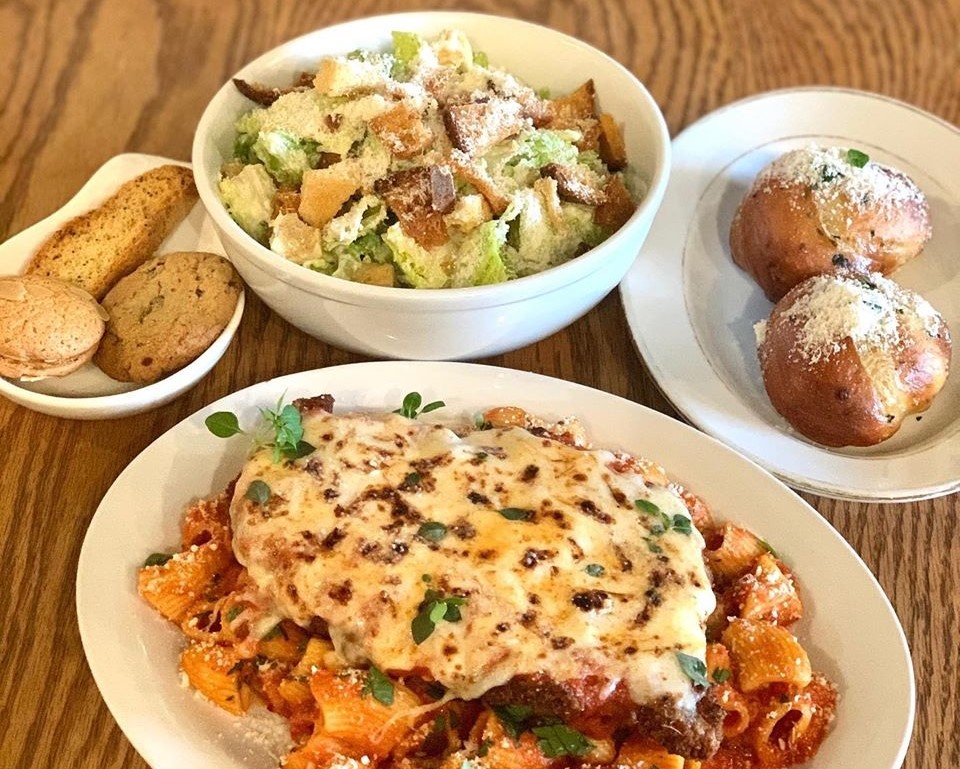
On March 16, when Orto owner Elan Kotz learned that bars and restaurants would be closing with the exception of carryout and delivery, he was on-site working at his new project to bring back The Dizz in Remington.
“When we got the news, we immediately had to pivot into, ‘What were we going to do at Orto?’” says Kotz. “That Monday, I got with the team and my brand new executive chef, Chris Audia, and I just decided, ‘Let’s do this thing.’ He and I ran the phones and he cooked and packaged every meal for our first carryout—and it was a great night. It was a very humbling and beautiful experience. It was really hard work, but it was satisfying to know that we were still able to feed our guests.”
Kotz is confident that diners will be ever eager to eat out once restaurants reopen. “Whether your restaurant is big, medium-sized, or small, every restaurant has a soul and a heart,” he says, “and guests who have become family will come back to support them.”
How are you?
I’m doing well. Every day is a new adventure. Each day presents its own challenges, but at the same time, I am super grateful that we are able to feed our guests and provide work for a portion of our team.
It seems like you’ve mastered the carryout format—I’ve had it myself and it’s excellent. You’ve told me that you even have “carryout regulars.” Why do you think you’ve been so successful?
I really attribute a lot of the success of this to our team. Chris Audia, our sous chef Kris Calivo, and our pastry chef Theresa Louis—Chris Audia’s wife. My GM and I focused on the front-of-the-house logistics and packaging. For us, the most important part was sticking to our guns and cooking the food that we’ve always cooked. We offer a chicken parm family meal to make people feel comforted and warm them up, but we’re also still offering the dishes we love to provide to our guests. We are just cooking what we know, and the response has been incredible.
“Orto is a very small, intimate space that feels really cozy, but are people going to want to sit close to each other? When are we going to be able to do that? What does the timeline look like? Those question marks are why it’s been really hard to make any sort of a real plan.” —Elan Kotz
Tell me more about your new chef.
Chris was our opening sous chef and he went to Chez Hugo for a little while. He and Theresa, who was also at Chez Hugo, started back with us on March 4. We had one week of solid time working together, and then they were confronted with the challenge of the global pandemic—they’ve handled it beautifully.
How are your revenues?
Our revenue is down about 50 percent now from where we were because we’ve moved to a five-day week. The weekdays have been inconsistent, but weekends are holding us up. We reduced our labor and are mindful about purchasing. We’ve been able to make it work—some weeks we were able to break even. In the beginning there were some hard weeks, but we’ve really hit a good rhythm.
What has it been like to be in the space without most of your staff and no guests?
Every day is different. March 17th was one of the hardest days of my life and career. I had to lay off a large portion of our staff and that was a really, really tough day for me.
It took us a while to readjust all lights, which are on automatic settings and dim throughout the evening. The first time the lights dimmed on that Tuesday, March 17th at 10 of five, letting us know that we were five minutes out from opening, it was an incredibly emotional thing for all of us. And then, that first Saturday night being in that space, the same space that we’ve served so many incredible people and made memories and had this beautiful food on the table, it was 8:15 p.m. and we had pushed out all of our catering. We didn’t have any more orders—I looked at everyone and was like, ‘This would be our biggest push right now.’
“The first time the lights dimmed on that Tuesday, March 17th at 10 of five, letting us know that we were five minutes out from opening, it was an incredibly emotional thing for all of us.” —Elan Kotz
What do you recommend for first timers taking out?
The chicken Parm dinner has been a hit for tons of guests. It’s served over house-made rigatoni with garlic buns that Theresa makes, a Caesar salad, and a revolving dessert. For two people, it’s $40. We are trying to deliver value, as well as comfort. Also, we have revolving batch cocktails. My go-to is a black Manhattan that we do with an Averna Amaro instead of the vermouth. We also just added little after-dinner drinks—three ounce pours of house-made limoncello orangecello, and grapefruit pompicello—which have always been part of our experience here. We’re also adding a cheese and salumi plate and a grilled swordfish loin with fregola and mussels.
How does your chef stay inspired?
We did have to turn into a carryout model overnight. We are joking internally that when we get through this thing, we are going to wear matching track suits and get patches that say, ‘1,000 chicken Parms served!’ It’s delicious, but it’s not the most technical thing to make. Chef is still inspired to cook seasonally, seeing the ingredients that have been available and getting inspired from there. Last week we rolled out a new lamb sugo pasta dish.
What’s happening with your project to bring The Dizz back in Remington?
In this current climate, I did just put it on hold. I started the project 11 days before the coronavirus hit. For now, I am slowly picking it up, but I don’t have a sense of a timeline yet. In the first 11 days of working there, we got everything off the walls and started cleaning.
What will the culinary landscape look like when the pandemic is over?
I don’t think any of us know what this looks like on the other side. Every restaurant is unique. Orto is a very small space and it’s intimate and feels really cozy, but are people going to want to sit close to each other? When are we going to be able to do that? What does the timeline look like? What does the rollout look like? Those question marks are why it’s been really hard to make any sort of a real plan. We’re taking it day by day, week by week.
I don’t think it’s going to go right back to what it was at all for a while, and I do think restaurants will have to continue to do carryout as part of their regular offerings just to ensure that they are making it work and making ends meet. I want to do a hybrid restaurant once we are able to.
“We cannot wait to serve people back at a restaurant table—that will be one of the very best days.” —Elan Kotz
What changes do you think will happen as a result of the pandemic?
I know there will be changes as it pertains to how people want to be served. There will be touchless bathrooms and a forever focus on everything cleanliness, which we’ve always done, but now it has to be even more visible and transparent for the comfort level of our guests. I believe we will still have restaurants to eat out in, although things might change a bit—they will have to for a while. But can we tell what the future holds? Absolutely not. Is there a chance that we have to pivot again? Maybe. Some iconic restaurants may never reopen.
There’s also a massive cost associated with a restaurant reopening. You have to restock everything. A lot of it will come down to the diner and their comfort level and ability. There’s also an economic implication. People need to have the money to eat out. I’m hopeful. I’m an eternal optimist. I know this will be just fine and we will get to the other side and be stronger for it. And hopefully a lot more grateful.
Why do restaurants matter?
Restaurants matter for multiple reasons. They’re a place where people who love to give and nourish can work, whether they’re a bartender, a cook, or a dishwasher. There’s this built-in feeling of giving to people when they come in and dine here. It’s a social gathering—people love to connect over food. Food memories are made in restaurants over birthdays and special occasions, but eating out is also a thing to do when you’ve had a hard day at work and don’t want to go home and cook something. Also, for me, we employ so many incredible human beings who’ve built their careers and spent their lives in restaurants, and they matter because we have to make sure that all these people have somewhere to go on the other side of this thing. We cannot wait to serve people back at a restaurant table—that will be one of the very best days.
